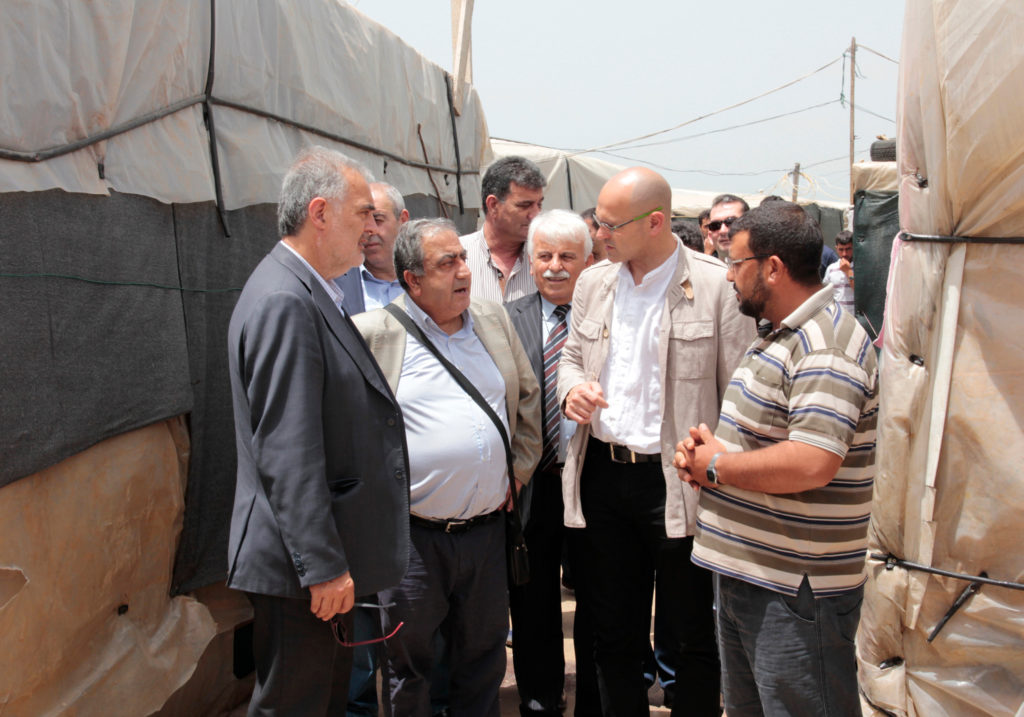15.05.2017 - 16:52
|
Actualització: 16.05.2017 - 16:55
Catalan Minister for Foreign Affairs, Raül Romeva, traveled to Lebanon to assess the Catalan cooperation projects which are being carried out there. Indeed, the Government is involved with 17 projects in the country in cooperation with several NGOs, the UN, and the Lebanese authorities. “We want to collaborate in building the necessary response to tackle the crisis in the Mediterranean,” said Romeva and added that “society is demanding” that Catalonia reaffirm its commitment with the refugees. Romeva made these statements after visiting the refugee camp and medical center in Halba, a village located in the Akkar area, next to the Syrian border, where 35% of the population are refugees.
Lebanon is the country with the highest number of refugees per capita. Indeed, one out of every four citizens is a refugee. Its geographic location next to Syria and the fact that it is the gateway to the Mediterranean explains why 1.1 million Syrians moved to Lebanon since the war started. In addition, Lebanon is also home to more than 450,000 refugees from Palestine and nearly 10,000 Iraqis. All this in a country which has roughly 4.4 million inhabitants.
The Catalan Government, together with the Catalan Fund for Development Cooperation, the Metropolitan Area of Barcelona, and the Barcelona City and Provincial Councils signed an agreement last December to act on the humanitarian crisis affecting the Middle East through the UN Development Programme in Lebanon and 15 other NGOs working in the territory.
Catalonia’s contribution to the project is twofold. First, it is bringing a monetary contribution of 800,000 euros and, second, it is providing technical knowledge, expertise, and best practices exchanges through the Catalan groups that are involved. The project, titled Lebanon Host Communities Support Project, enjoys the participation of other countries such as Italy, Japan, Germany, Holland, Norway, the United Kingdom, and the United States.
Guaranteeing basic services for the population
The Catalan Minister for Foreign Affairs referred to the impact that the refugees’ arrival has had on basic services on a local scale and assured that Catalonia aims to “reinforce these services for the whole of the population”. Romeva also met with Halba’s mayor, the region of Akkar’s governor and MPs, and the president of the municipalities. This particular project is promoted by the Catalan Government in collaboration with three NGO’s: the Catalonia-Lebanon Association, Foundation Peace and Solidarity, and Lebanese Popular Aid.
Later, Romeva met Tripoli’s Mayor and visited Al Fayhaa’s Union of Municipalities’ waste plant, a project carried out by the Lebanese Ministry for Social Affairs (MOAS) together with the United Nations Development Programme. The initiative aims to manage, eliminate, and recycle waste but also to improve water provisioning and primary health care.
On Monday, Romeva will meet with several different representatives from the UN, the EU representative in Lebanon, and with Lebanese Ministry for Social Affairs (MOAS) to analyze new ways these can work together with the Catalan Government.



